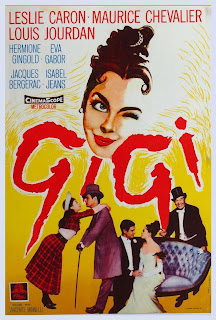by Chris Marshall:
Believe it or not, Gigi is a pretty good movie. When I see a period piece musical set in France, the last thing I expect is to like it, but here we are.
Leslie Caron, who we last saw in An American in Paris, plays the title role so well that I completely forgot about how much I didn’t like her character in that film. It had nothing to do with her, but nothing happened to make me care. In Gigi, though, she’s charming, devious, mischievous, a sort of primordial Juno, if Juno were less abrasive.
Indeed, it is the performances as a whole, rather than the musical numbers themselves, that make this movie so effective. Alongside Caron, Louis Jordan is also tremendous as Gaston, the upper-class socialite/playboy who ultimately falls for Gigi. And Maurice Chevalier as the quasi-narrator Honoré is extremely enjoyable as well .
Gaston’s “adventures” are very well known in the high society papers, and he’s made it clear that he has no intention of getting married. Many people take this to mean he’s somehow fundamentally a bad person, not to be trusted, but he explains to Honoré that he’s simply bored with the sameness of everything. Upper class women, as well as men, are expected to behave so properly and according to such a strict code that it has taken all the variety out of life.
Here lies the appeal of Gigi. As far as her caretakers are concerned, she’s a hopeless case, completely unable (or unwilling) to learn appropriate manners for a woman of her station. She’s a carefree spirit, more concerned with having fun and cheating Gaston in card games than behaving like a “lady.” Because of this, Gaston spends more and more time with her; he’s long been a friend of the family. Slowly, inevitably, he begins to realize that he’s romantically interested in her.
Gigi reciprocates, but believing she finally needs to behave “properly” if she goes out with him, she puts all her effort into acting high class. Of course, her indifference toward these trappings was what attracted him in the first place. If she’s exactly the same, then what’s the point? Problems ensue.
 |
| Louis Jordan (Gaston) and Leslie Caron (Gigi) |
If you’ve ever seen a romantic comedy, which this pretty much is, this comes as no surprise. This genre, like any other, has certain patterns it always follows. The simplified, bare bones version is Act 1: Meet Our Characters, Act 2: Romance Blooms But Problems Ensue, Act 3: Reconcile Differences And Live Happily Ever After. You know how it works. This isn’t a criticism, just an acknowledgment that as a genre film, you know what you’re going to get.
Although I do feel the success of this film is largely due to the acting and the characters, the musical numbers are fun as well. “It’s a Bore,” in which Gaston goes to great lengths to explain how weary of life he is, was stuck in my head all day. I have to admit that “Thank Heaven for Little Girls” was a little unsettling, if only because it gives the impression that Gigi is a child, rather than a twentysomething. But this misunderstanding is soon cleared up.
Gigi never achieves greatness, but I don’t think that’s what it was aiming for. Vincente Minnelli wanted to make pure entertainment, and if it attained something higher, then all the better. Like many of the most enjoyable Best Picture winners, it limits itself to a small scale; the vast majority of scenes in this film took place in the same two or three settings. In this era of epics, that’s refreshing to see.
Basically, what I’m saying is that this couldn’t possibly be any more different from last year’s winner (The Bridge on the River Kwai) or next year’s winner (Ben-Hur). I’m grateful for that. I can only take so many three hour epics in a row.

No comments:
Post a Comment